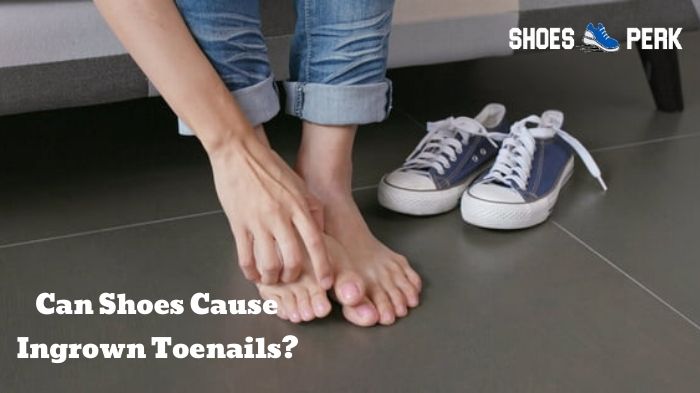Ingrown toenails are the most common issue due to wearing shoes that do not fit correctly. Most people experience this once or twice, or some face it repeatedly. It may show a minor discomfort early, but it progresses into an infection if you do not take proper treatment. In this guide, we will talk about “can shoes cause ingrown toenails” and how to get relief from this situation.

Ingrown Toenails
An ingrown toenail is a common situation in which a toenail’s side or corner grows into the skin. This might cause pain, redness, swelling, and pus. Ingrown toenails can occur on any toe, but are most common on the big toe. There are various causes for this foot disease. Some of them are.
- Improper toenail trimming
- Genetics
- Improper shoe fitting
- Injury from pedicures or nail picking
- Abnormal gait
- Poor hygiene

How do Shoes Contribute to Ingrown Toenails?
1- Your Shoes Tight-fitting
When your shoes are too tight force your toes together, this constant pressure on the toes causes the edges of your toenails to dig into the surrounding skin. It’s like a continuous pressure that creates an ideal setting for developing ingrown toenails. This usually appears in high heels, narrow-toed dress shoes, or athletic shoes that are too small.
2- Shoes with Shallow Toe Boxes
The toe box is the area where your toes rest in a shoe. If your shoes have insufficient depth in this area, then your toes may curl or bunch up. This unusual posture increases pressure on the toenails, potentially leading to ingrown ones. People with naturally curved toes are especially susceptible to this problem.
3- Repeated Friction
Particular types of shoes, such as flip-flops or sandals with thin straps, might rub against your toenails. This frequent rubbing can irritate the skin surrounding the toes and promote ingrown nail formation. It’s critical to be aware of the possibility of friction and buy footwear that reduces that danger.
Also read our shoes care guide for your footwear longevity.
Shoe Selection Chart for Those Having Ingrown Toenails
| Type of Shoes | Recommendations |
| Roomy Toe Box | Choose shoes with an airy toe box that allows toes to move freely. |
| Deep Toe Area | Select a shoe style with a deeper toe area ideal for naturally curved toes. |
| Good Support | Look for footwear providing ample support and cushioning. |
| Comfortable Fit | Avoid tight-fitting shoes, especially those with narrow toes. |
| Breathable Material | Select shoes that are made from breathable materials for added comfort. |
| Soft Ballet Flats | Choose rounded or square toes. Wide forefoot and flexible materials offer pressure-free comfort. |
How to Identify Shoes Related Ingrown Toenails?
Here are some tips to help identify whether your shoe creates an ingrown toenail issue.
Location: If you are facing repeatedly ingrown toenails on the same toe or mainly on the big toe, then your shoe is the reason for this issue.
Frequency: Frequent ingrown toenail flare-ups, particularly after wearing specific shoes, are a strong clue that your footwear is the cause of this problem.
Read more: how to take care of leather soles?
Get Relief from Shoes Related Ingrown Toenails
If you find your shoe is the main culprit of this problem, then switching to shoes with a wider toe box or better fit leads to a noticeable improvement in the ingrown toenail situation. However, choose a style with a deeper toe area, especially if your toes are naturally curled.
Select shoes for Ingrown Toenails with extra support and cushioning to prevent strain on the toenails. Always prioritize comfort, appropriate fit, and styles, encouraging general foot health to avoid ingrown toenail issues.
What if it’s not the Shoes?
Suppose your shoes are not the reason for ingrown toenails. Then, do not ignore the painful toe. If it is not treated on time, this may cause serious problems. Infections around the nail edge can penetrate deeper and spread into adjacent tissues, finally reaching the bone itself. This is especially dangerous for those with diabetes or poor circulation, as their systems may struggle to combat the infection.
Remember, a brief talk with your podiatrist about that irritating ingrown nail might save you a lot of discomfort and potential problems in the future. Instead of toughing it out, care for your toenails as the doctor recommends.
Bottom Lines
While buying your footwear, know correctly about that shoe and your feet’ condition. This may significantly reduce the risk of ingrown toenail painful experiences. Your shoe should be comfortable and supportive, not an instrument of toe torture. It is recommended that you talk to your doctor and follow his prescribed way of care for your toenails.
